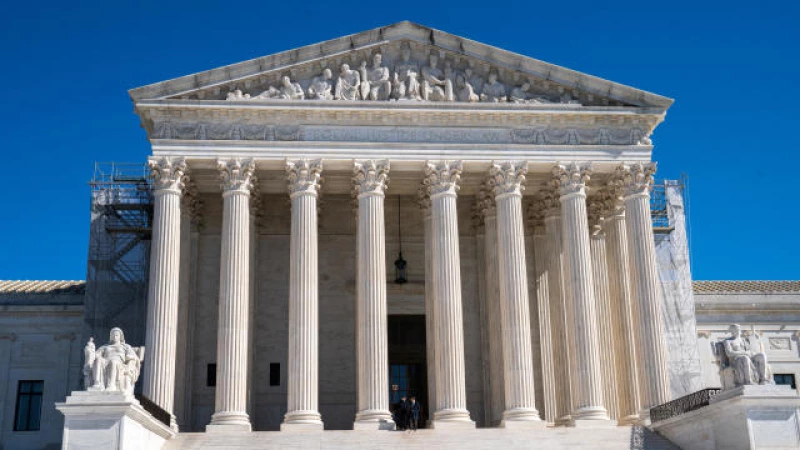Washington — The Supreme Court on Friday provided clarity on the circumstances under which a public official can be sued for blocking a constituent on social media. Two cases involving local officials who blocked users for Facebook comments were returned to lower courts for further review.
In a unanimous opinion authored by Justice Amy Coney Barrett in the first case concerning a city manager from Port Huron, Michigan, the court established a two-part test to determine when a public official's social media activity can be attributed to the government, opening the door for potential legal action.
According to the new standard, an official's actions on social media are considered state action only if the official had actual authority to represent the government and explicitly exercised that authority while engaging on social media. If these criteria are met, social media users have the right to pursue legal action against public officials for blocking them.
The court highlighted that the test outlined in its opinion differs from the approaches taken by lower courts in the two cases involving public officials who blocked constituents on social media. Consequently, the cases were remanded for further proceedings in line with the Supreme Court's decision.
The justices heard arguments in both cases, known as Lindke v. Freed and O'Connor-Ratcliff v. Garnier, in October, during which they tackled questions of how elected officials interact with their constituents in the digital age, and when those interactions may infringe on free speech rights. The legal battles raised an issue that arose during former President Donald Trump's presidency, when he was sued by some Twitter users who were blocked from interacting with his account. A federal appeals court said Trump's move was unconstitutional, but the Supreme Court wiped away the decision and ordered the case dismissed after he left office.
The cases before the Supreme Court
The first case, involving Port Huron city manager James Freed, arose after resident Kevin Lindke posted comments to Freed's Facebook page that criticized the city's handling of the COVID-19 pandemic. Freed had a private Facebook profile that he converted to a public page after he was named city manager in 2014. The page identified him as a "public figure," and listed a Port Huron website and email address, as well as City Hall for the physical address associated with the page.
Freed wore a city manager's pin in the profile photo, and he used the page to share information about city programs, his work as city manager and, in early 2020, updates about the pandemic. He also shared personal updates.
While Freed and Lindke engaged in some back-and-forth on the Facebook page about the city's COVID response, Freed deleted the constituent's comments and blocked each of the three Facebook profiles that Lindke was using to post responses.
Lindke then sued, alleging his First Amendment rights were violated when Freed deleted his comments and blocked his accounts.
Court Rules Social Media Activity of Public Officials Not Always State Action
A recent court ruling highlighted the distinction between personal and official social media activity by public officials. The case involved two separate instances where public figures created public social media profiles.
In the first case, a federal district court and the U.S. Court of Appeals for the 6th Circuit determined that a city manager, Freed, was not engaging in state action when using his personal Facebook page. The courts established a "duty-or-authority test," stating that social media activity would only be subject to constitutional scrutiny if it was related to governmental duties or relied on state authority. Since Freed operated his Facebook page in a personal capacity without using government resources, the courts found his activity to be protected from First Amendment scrutiny.
The second case involved two members of a school board who created public social media pages during an election campaign. Residents who frequently interacted with these pages were found to be making repetitive and non-responsive comments. Despite the interactions, the courts did not consider the officials' social media activity as state action, as it was not conducted in an official capacity.
These cases serve as a reminder that not all social media activity by public officials falls under the umbrella of state action, emphasizing the importance of distinguishing between personal and official online presence.
The Supreme Court's ruling
Rebutting the comments, O'Connor-Ratcliff and Zane decided to block the Garniers from their social media accounts, leading to a lawsuit from the couple. The Garniers contended that the board members infringed upon their First Amendment rights by blocking them on social media, arguing that these platforms were public domains.
A federal district court supported the Garniers, determining that O'Connor-Ratcliff and Zane's act of blocking them constituted state action. The court noted that the board members had "enveloped [their social media pages] in the guise of [their] official position" by displaying their roles as board members, identifying themselves as government officials, and using a school district email address on the page, particularly in O'Connor-Ratcliff's case.
The U.S. Court of Appeals for the 9th Circuit upheld the lower court's ruling and affirmed that the Garniers' First Amendment rights had been breached. O'Connor-Ratcliff and Zane were deemed to have "operated under the color of state law by utilizing their social media pages as public forums while executing their official responsibilities" because "they adorned their pages with the authority of their positions and utilized them to communicate about their official tasks."
Writing for the unanimous court, Barrett highlighted that the differentiation between private actions and state action "depends on substance, not labels: Private entities can act with state authority, and state officials have personal lives and their own constitutional rights."
One expert highlighted the importance of a social media profile's design and usability in one aspect of the new evaluation, but stressed that they are not a substitute for official state recognition.







